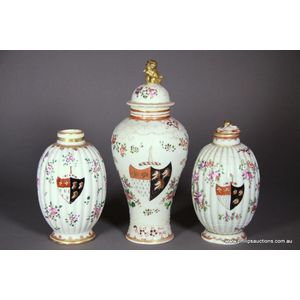Samson Porcelain Tea Caddies and Covered Vase
You must be a subscriber, and be logged in to view price and dealer details.
Subscribe Now to view actual auction price for this item
When you subscribe, you have the option of setting the currency in which to display prices to $Au, $US, $NZ or Stg.
- Manner of .... / Style of ..... - A cataloguing term where the item, in the opinion of the cataloguer is a work in the style of the artist, craftsman or designer, possibly of a later period.
- Gilding - Gilding is a method of ornamentation whereby a thin sheet of gold metal is applied to items made of wood, leather, ceramics, glass and silver for decorative purposes.
For furniture including mirrors, the sheet of gold is usually applied over a coating of gesso. Gesso is a mixture of plaster of Paris and gypsum mixed with water and then applied to the carved wooden frames of mirrors and picture frames as a base for applying the gold leaf. After numerous coats of gesso have been applied, allowed to dry and then sanded a coat of "bole", a usually red coloured mixture of clay and glue is brushed on and allowed to dry, after which the gold leaf is applied. Over time parts of the gilding will rub off so the base colour can be seen. In water gilding, this was generally a blue colour, while in oil gilding, the under layer was often yellow. In Victorian times, gilders frequently used red as a pigment beneath the gold leaf.
Metal was often gilded by a process known as fire gilding. Gold mixed with mercury was applied and heated, causing the mercury to evaporate, the long-term effect of which was to kill or disable the craftsman or woman from mercury poisoning. The pursuit of beauty has claimed many victims, not the least of which were the artists who made those pieces so highly sought after today. - Emeralds - Emeralds have been used in jewellery making for thousands of years, and are prized for their deep green colour, which is caused by the presence of chromium and vanadium in the mineral beryl. Because of their rare colour, emeralds are often more valuable than diamonds of a similar size and quality. In jewellery making, emeralds are typically cut into round or oval shapes to maximize their color and clarity. They are often set in gold or platinum and used as the centrepiece of a piece of jewellery, such as a ring or necklace. They can also be used in combination with other gems, such as diamonds, to create intricate and beautiful designs.
- A/f, as Inspected - The letters "A/F" or "as inspected" as part of a description is the cataloguer's shorthand for "all faults" or "as found", meaning the item has some type of damage or deficiency, it is of uncertain date or provenance, and/or that the seller takes no responsibility for the completeness of the item or the accuracy of the description.
This item has been included into following indexes:
- tea caddies, Oriental
Visually similar items

Two Satsuma vases, one squat formed, tallest 13 cm high (2)

An opposite pair of Satsuma vases, Meiji period, circa 1910, signed, the baluster vases with figural lug handles and faux rings with pendant drapery, well decorated with pairs of opposite images, both figural narrative scenes in subtle tones with gilt high

Herend 'Chinois' perfume bottle, with butterfly top, height 14 cm

A pair of Chinese export armorial covered vases, 19th century, baluster shaped and shouldered with a narrow neck surmounted by a delicate domed lid with finial, exquisitely painted with polychrome flowers in pink and iron red to the collar and base, with s
